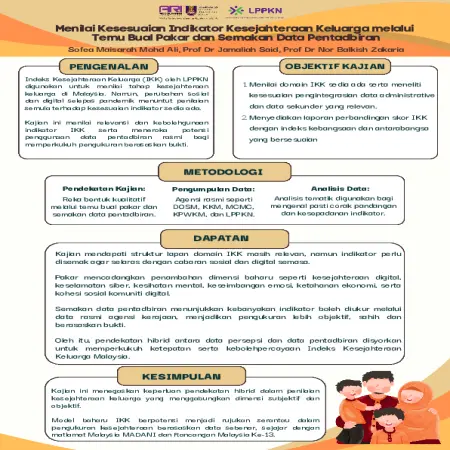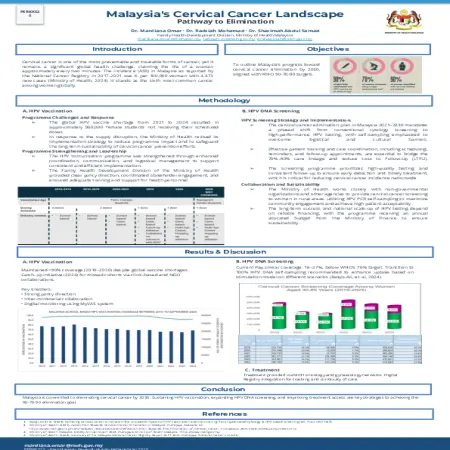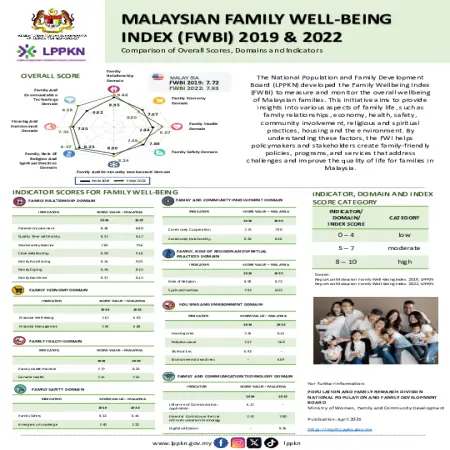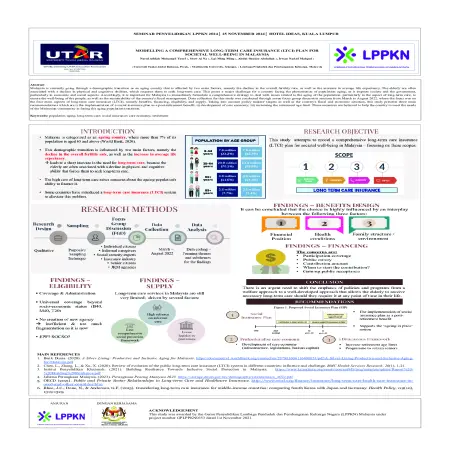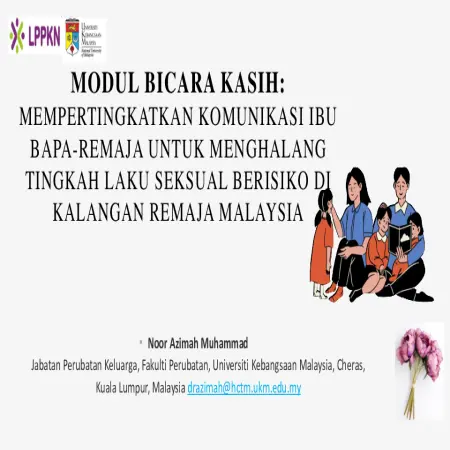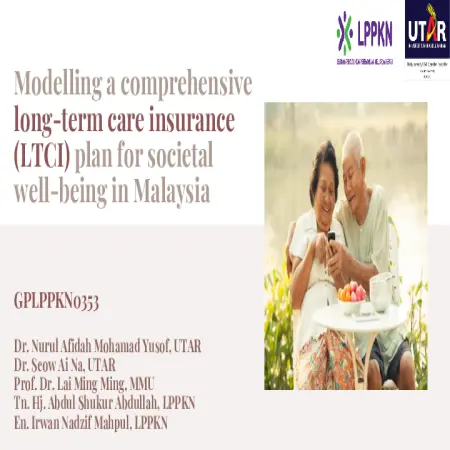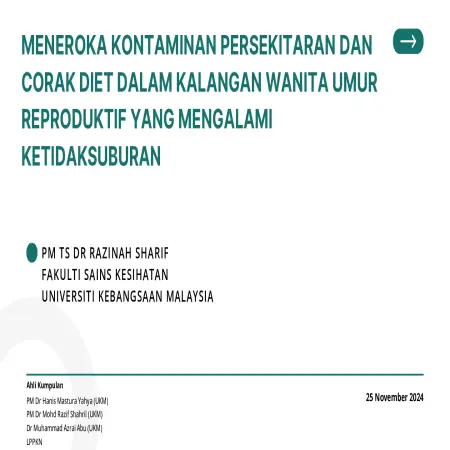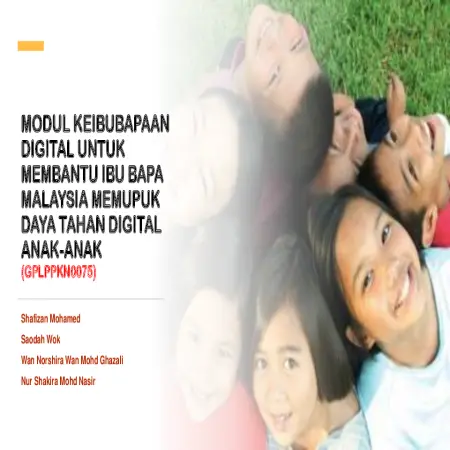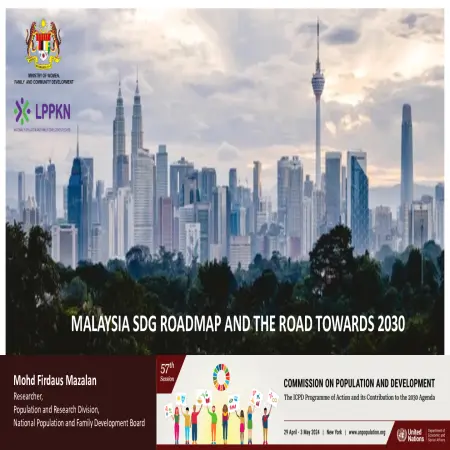PUBLICATIONS
|
|
Menilai kesesuaian indikator kesejahteraan keluarga melalui temu bual pakar dan semakan data pentadbiran
Item Type: Scientific Poster
Editor:
Year: 00/11/2025
Abstract: The Family Well-being Index (FWI) by the NPFDB is used to assess the level of family well-being in Malaysia. However, social and digital changes after the pandemic require a reassessment of the suitability of existing indicators. This study assesses the relevance and usability of the FWI indicator and explores the potential of using official administrative data to strengthen evidence-based measurement.
|
|
|
|
|
|
Malaysia’s cervical cancer landscape pathway to elimination
Item Type: Scientific Poster
Editor:
Year: 00/11/2025
Abstract: Cervical cancer is one of the most preventable and treatable forms of cancer, yet it remains a significant global health challenge, claiming the life of a woman approximately every two minutes. The incidence (ASR) in Malaysia as reported by the National Cancer Registry in 2017-2021 was 6 per 100,000 women with 4,473 new cases (Ministry of Health). It stands as the sixth most common cancer among women globally. The objective of this study is to outline Malaysia’s progress toward cervical cancer elimination by 2030, aligned with WHO 90-70-90 targets. Conclusion, Malaysia is commited to eliminating cervical cancer by 2030. Sustaining HPV vaccination, expanding HPV DNA screening, and improving treatment access are key strategies to achieving the 90-70-90 elimination goal.
|
|
|
|
|
|
Maternal mental well-being: challenges and implications for the family institution
Item Type: Article
Editor:
Year: 00/06/2025
Abstract: Maternal mental well-being is a key determinant of overall family well-being. However, various modern challenges negatively impact mothers’ well-being and increase the risk of parental burnout. This study aims to examine the roles and involvement of mothers in family institutions, their perceptions of motherhood, the key challenges they face, and the current status of their mental health status. The study involved 3,988 Malaysian mothers aged 18 and above with children. Data were collected through an online survey in May 2024 using a convenience sampling method and analysed descriptively using Statistical Package for Social Sciences (SPSS) software. Findings indicate that mothers play a dominant role in doing housework (48.0%), managing children’s education (41.0%), ensuring daily needs are met (36.6%) and maintaining family health (34.8%). In terms of perception, most Malaysian mothers believe that being a mother today is more challenging than in the past. The primary challenges faced by mothers include the rising cost of living (80.0%), work-family imbalance (66.8%) and financial stress (58.9%). The study found that 32.2% of respondents reported experiencing depression due to these challenges, with 10.3% frequently feeling depressed. Additionally, only 16.6% of mothers felt that society truly understands the struggles they face. This study highlights the need for integrated interventions such as family-friendly policies, flexible work arrangements, and stronger social support to help mothers manage their mental well-being. These measures can alleviate maternal stress, contributing to family stability and overall societal well-being.
|
|
|
|
|
|
Malaysian Family Well-Being Index (FWBI) 2019 & 2022: Comparison of Overall Scores, Domains and Indicators
Item Type: Infographic
Editor:
Year: 00/12/2024
Abstract: The National Population and Family Development Board (LPPKN) developed the Family Wellbeing Index (FWBI) to measure and monitor the overall wellbeing of Malaysian families. This initiative aims to provide insights into various aspects of family life, such as family relationships, economy, health, safety, community involvement, religious and spiritual practices, housing and the environment. By understanding these factors, the FWI helps policymakers and stakeholders create family-friendly policies, programs, and services that address challenges and improve the quality of life for families in Malaysia. Overall scores Malaysia FWBI is 7.72 (2019) while Malaysia FWBI is 7.93 (2022)
|
|
|
|
|
|
Modelling a comprehensive Long-Term Care Insurance (LTCI) plan for societal well-being in Malaysia
Item Type: Scientific Poster
Editor:
Year: 00/11/2024
Abstract: Malaysia is currently going through a demographic transition as an aging country that is affected by two main factors, namely the decline in the overall fertility rate, as well as the increase in average life expectancy. The elderly are often associated with a decline in physical and cognitive abilities, which requires them to seek long-term care. This poses a major challenge for a country facing the phenomenon of population aging, as it impacts society and the government, particularly in economic and social aspects. Accordingly, it is important for Malaysia to immediately formulate a comprehensive strategy to deal with issues related to the aging of the population, particularly in the aspect of long-term care, to ensure the well-being of the people, as well as the sustainability of the country's fiscal management. Data collection for this study was conducted through seven focus group discussion sessions from March to August 2022, where the focus was on the four main aspects of long-term care insurance (LTCI), namely benefits, financing, eligibility, and supply. Taking into account policy makers' targets as well as the country's fiscal and economic situation, this study presents three main recommendations which are i) the implementation of a social insurance plan as a post-retirement benefit; ii) development of care economy; iii) increasing the retirement age limit. These measures are believed to help the country to meet the needs of the Malaysian community in facing the aging population transition.
|
|
|
|
|
|
Mempertingkatkan komunikasi ibu bapa- remaja untuk menghalang tingkah laku seksual berisiko di kalangan remaja Malaysia
Item Type: Conference or Workshop Item
Editor:
Year: 00/11/2024
Abstract: Parental communication with teenagers regarding reproductive and sexual health (SRH) remains minimal in Malaysia, with the topic being considered taboo and sensitive, rarely discussed openly within families. Teenagers are exposed to high-risk sexual activities, with 10-15% having engaged in sexual activity. This study aims to develop a communication module specifically for guiding parents in discussing reproductive and sexual health with their teenage children. Additionally, it seeks to analyze the perspectives of both parents and teenagers regarding RS communication and design the "BICARA Kasih" Module for parents. The conclusion of this study is that the module can be used by parents when addressing sexual issues with their children, especially teenagers aged 10 and above, and this module has the potential to be made available in digital format.
|
|
|
|
|
|
Modelling a comprehensive Long-Term Care Insurance (LTCI) plan for societal well-being in Malaysia
Item Type: Conference or Workshop Item
Editor:
Year: 00/11/2024
Abstract: Malaysia is currently going through a demographic transition as an aging country that is affected by two main factors, namely the decline in the overall fertility rate, as well as the increase in average life expectancy. The elderly are often associated with a decline in physical and cognitive abilities, which requires them to seek long-term care. This poses a major challenge for a country facing the phenomenon of population aging, as it impacts society and the government, particularly in economic and social aspects. Accordingly, it is important for Malaysia to immediately formulate a comprehensive strategy to deal with issues related to the aging of the population, particularly in the aspect of long-term care, to ensure the well-being of the people, as well as the sustainability of the country's fiscal management. Data collection for this study was conducted through seven focus group discussion sessions from March to August 2022, where the focus was on the four main aspects of long-term care insurance (LTCI), namely benefits, financing, eligibility, and supply. Taking into account policy makers' targets as well as the country's fiscal and economic situation, this study presents three main recommendations which are i) the implementation of a social insurance plan as a post-retirement benefit; ii) development of care economy; iii) increasing the retirement age limit. These measures are believed to help the country to meet the needs of the Malaysian community in facing the aging population transition.
|
|
|
|
|
|
Meneroka kontaminan persekitaran dan corak diet dalam kalangan wanita umur reproduktif yang mengalami ketidaksuburan
Item Type: Conference or Workshop Item
Editor:
Year: 00/11/2024
Abstract: The environment and dietary patterns have a significant impact on reproductive-age women experiencing infertility. Every year, fertility rates among women decline in many countries. Pollutants are constantly present in our surroundings, and environmental contaminants are commonly found in food, cooking ingredients, medications, and kitchenware that we use daily, which contribute to the causes of female infertility. Therefore, there is a need for monitoring the food industry/chemicals in food and raising public awareness about the importance of being mindful of both their diet and the surrounding environment.
|
|
|
|
|
|
Modul Keibubapaan Digital untuk membantu ibu bapa Malaysia memupuk daya tahan digital anak-anak
Item Type: Conference or Workshop Item
Editor:
Year: 00/11/2024
Abstract: This study aims to understand how digital media influences parenting styles in Malaysia. It examines Malaysian parents' perceptions of the risks associated with their children's use of digital media. Additionally, the study analyzes the digital parenting styles currently practiced by Malaysian parents, identifies the skills and knowledge needed for digital parenting, and suggests educational modules to support Malaysian parents in becoming digital enablers. Recognizing that parents are often reluctant to engage in conventional training, this study proposes making digital parenting education more flexible and accessible through inclusive online learning platforms.
|
|
|
|
|
|
Malaysia SDG roadmap and the road towards 2030
Item Type: Conference or Workshop Item
Editor:
Year: 00/05/2024
Abstract: Malaysia has undertaken periodic reviews to assess the achievement of ICPD goals and objectives. Malaysia has continuously embraced sustainable development in the national agenda. In this regard, the commitment to the 2030 Agenda for Sustainable Development (2030 Agenda) has been mapped with the Mid-Term Review of the 11th Malaysia Plan to support the Sustainable Development Goals (SDGs). The national development priorities of the Twelfth Plan continue to be aligned to the Sustainable Development Goals (SDGs) of the 2030 Agenda.
|
|
|
|





